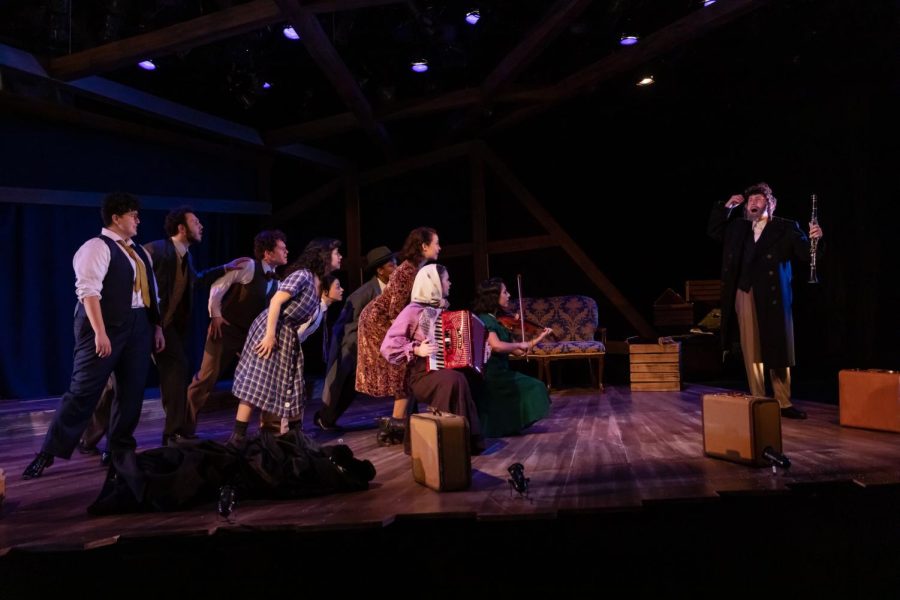‘Indecent’ Is a Singing, Dancing, Storytelling Sensation
Fordham Theatre’s newest mainstage show “Indecent” is the perfect mix of drama, romance, music and history
COURTESY OF JOSEF MORO
Paula Vogel’s “Indecent” explores the struggles of Jewish immigrants and a queer relationship within the theatre industry during pre-World War II Europe.
March 23, 2023
The play begins in a small home in Poland in the early 1900s that is crafted with wooden floors, a faux stage and vintage furniture that transports the audience into a quaint, cozy European house. As it begins, the play starts with an eccentric introduction of the cast accompanied by members playing the accordion, strings and various percussion instruments.
On Thursday night, Feb. 23, “Indecent,” directed by Julie Kramer and choreographed by Mandie Rapoza, had its opening night in Fordham’s Pope Auditorium as part of the Fordham Theatre 2022-23 Mainstage series. This vibrant yet heavy show captures a cultural and historical moment in history that impacted the American theater industry forever.
Written by Pulitzer Prize-winner Paula Vogel, “Indecent” was influenced by the true story of Sholem Asch’s controversial play, “God of Vengeance.” This play was put on for the first time in 1907 in Yiddish, and from there it toured across Europe and became a success.
“God of Vengeance” is a one-of-a-kind sapphic love story. It tells the story of Yankel, a Jewish brothel owner who is insistent on keeping his daughter Rivke pure and ready for marriage. However, Rivke falls for one of the prostitutes employed by her father, and they begin a secret relationship.
Asch was one of the first playwrights who told the stories and dreams of his people. For many Europeans, this was the first time they had seen a Yiddish writer explore the ways of life for many Jewish individuals living in Poland, which was very important and powerful to witness. The controversy around “God of Vengeance” only began once it came to America, where it was called “indecent” for public viewing.
What made this play so different from others of its time was the inclusion of this queer relationship, as well as the cast full of Jewish immigrants. Historically, the early 20th century was a tumultuous time for immigrants in America. The play covers themes of antisemitism, homophobia and misogyny that showcase the struggles that these individuals faced in their mission to create and share art.
The cast was able to truly transform themselves into these roles, creating a powerful performance given all of the moving parts and intense themes of this play. There was never a moment while I was watching when I did not feel one hundred percent engaged and like I was really in their world.
The incredibly powerful message that this play conveys was truly captured and wrapped up in one of its final scenes. “The Rain Scene” famously describes a scene from “God of Vengeance” that was cut from the play once it reached America, causing the cast to be arrested for indecency. As the two women, Chana, played by Lili Gutierrez, Fordham College at Lincoln Center (FCLC) ’23, and Halina, played by Ashira Fischer-Wachspress, FCLC ’23, share an intimate moment on stage, rain pours down over them, creating a memorable and meaningful moment for audience members.
Fischer-Wachspress said that the rain scene was an expression of “Jewish joy, Queer joy and human joy.”
While this play contains many heavy and difficult themes, as the characters in this play experience extreme suffering, ultimately “the power of love is what keeps them alive,” Fischer-Wachspress said.
Closure practices were crucial for this cast, as they immersed themselves into their characters that experienced some incredibly deep emotions. After each rehearsal, they had a ritual of coming together as a cast and taking some deep breaths together to ensure that they stepped out of their characters and back into the real world. Fischer-Wachspress said that it was to “protect the story, and themselves.”
What made this performance of “Indecent” so special was the commitment of the cast. With all of the moving parts of this play, cast members even took it upon themselves to learn new instruments. Fischer-Waschpress described it as “our ‘Indecent’” and said that the energy that was in the room in each rehearsal was something beautiful.















